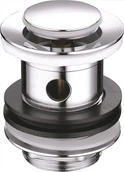Hey there! I'm a supplier of sink waste, and today I wanna chat about how sink waste interacts with other household waste. It's a topic that might not seem super exciting at first, but it's actually pretty important for keeping our homes clean and our plumbing systems in good shape.
First off, let's talk about what sink waste is. Sink waste mainly includes things like food particles, soap scum, hair, and small debris that go down the drain when we wash our hands, do the dishes, or brush our teeth. This kind of waste is different from other household waste like kitchen garbage (food leftovers in the bin), paper waste, or recyclables.
When sink waste starts its journey down the drain, it first encounters the drain trap. A common type is the Bottle Trap And Waste. This trap is designed to hold a small amount of water, which acts as a barrier to prevent sewer gases from coming back up into our homes. But it also catches some of the larger particles in the sink waste. For example, hair and chunks of food can get stuck in the trap. If we don't clean it regularly, these trapped particles can build up and cause clogs.
Now, let's see how sink waste interacts with other types of household waste in the plumbing system. In most homes, the sink drain is connected to the main sewer line, along with other drains like those from the toilet, bathtub, and washing machine. When sink waste mixes with the waste from the toilet, it's a bit of a different story. Toilet waste usually contains human waste and toilet paper, which are designed to break down in the sewer system. But if a large amount of sink waste, especially non - biodegradable stuff like plastic or metal objects that accidentally go down the sink, gets into the sewer line, it can cause problems.
The Basin Waste Drain is an important part of the sink waste system. It helps to channel the sink waste from the sink to the main sewer line. Sometimes, the waste from the sink can mix with the waste from the washing machine. Washing machine waste often contains detergents, lint, and small fabric fibers. When these mix with sink waste, they can form a sticky mess in the pipes. If there are already some clogs caused by sink waste in the pipes, the addition of washing machine waste can make the situation worse.
Another thing to consider is the interaction between sink waste and rainwater drainage. In some areas, the stormwater drains are separate from the sewer drains. But in others, they might be combined. If sink waste contains chemicals like cleaning agents, and it enters the combined drainage system, it can have an impact on the water quality in the local water bodies. These chemicals can be harmful to aquatic life.
Let's talk about how different types of sink waste interact with each other. For example, soap scum and food particles can combine to form a gooey substance that sticks to the inside of the pipes. This can reduce the flow of water through the pipes and increase the risk of clogs. Hair is another common problem. It can wrap around other debris in the pipes, making it even harder to remove.
Now, I wanna mention the Chrome Pop Up Waste Drain Without Overflow. This type of drain is a popular choice for sinks. It allows us to control the flow of water in the sink easily. But it can also be a place where sink waste accumulates. The pop - up mechanism can get jammed with hair and debris, preventing it from working properly.
So, what can we do to manage the interaction between sink waste and other household waste? First, we should be careful about what we put down the sink. Avoid putting large food scraps, grease, or non - biodegradable items down the drain. Regularly clean the drain traps to prevent clogs. We can also use drain cleaners, but we need to be careful as some of them can be harsh on the pipes.


As a sink waste supplier, I know how important it is to have high - quality sink waste products. Good quality drains and traps can help to reduce the problems caused by sink waste. They are designed to catch debris effectively and allow the smooth flow of water. If you're having issues with sink waste or just want to upgrade your sink waste system, I'd love to have a chat with you. Whether you're a homeowner looking to improve your plumbing or a contractor working on a new project, we can find the right sink waste solutions for you. Reach out to me for a friendly chat and let's figure out the best options for your needs.
In conclusion, understanding how sink waste interacts with other household waste is crucial for maintaining a healthy plumbing system and a clean home environment. By being more aware of what we put down the sink and taking proper care of our plumbing, we can avoid a lot of problems. And if you're in the market for sink waste products, don't hesitate to get in touch.
References
- "Plumbing Basics: A Guide to Home Plumbing Systems" by DIY Home Improvement Guides
- "Environmental Impact of Household Waste Disposal" by Environmental Protection Research Institute






